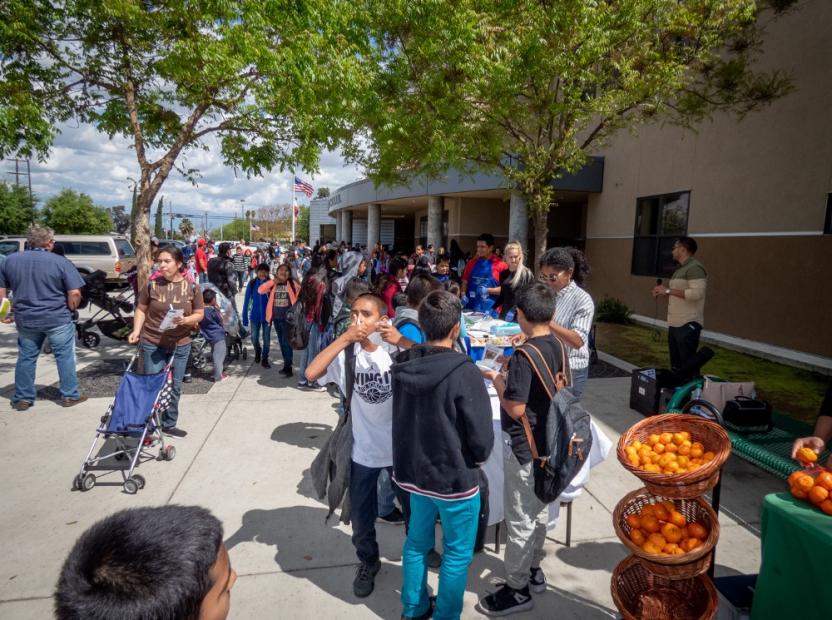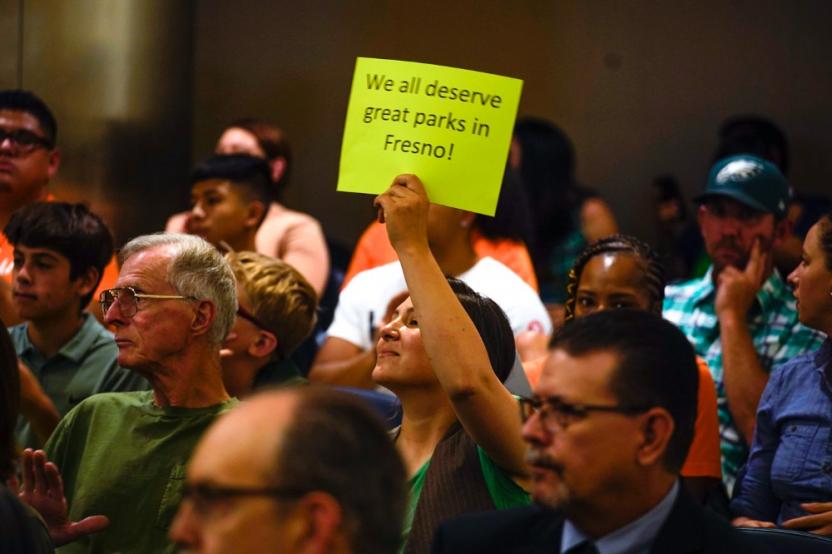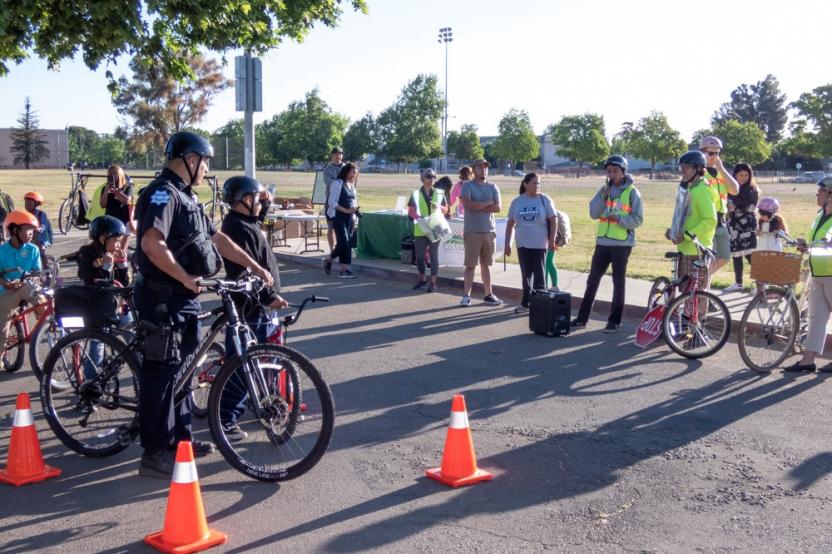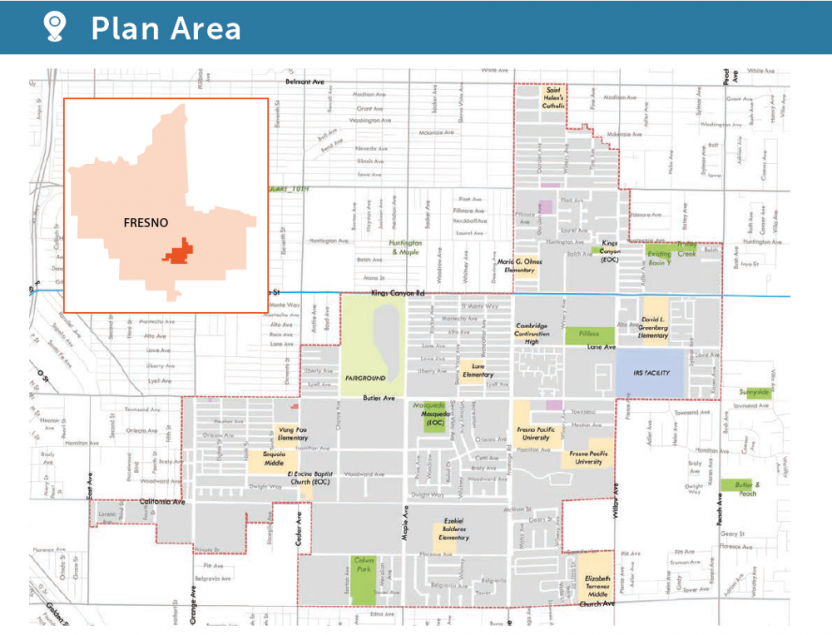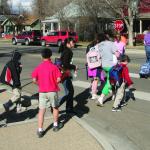The Fight for Health Equity in California’s Central Valley
Ongoing Challenges, Community-Based Solutions
A farming community where residents can’t easily buy produce? This outlandish situation is an everyday reality for residents of Southeast Fresno, California, where lack of access to healthy foods contributes to high rates of chronic disease.
That’s why residents have been coming together to overcome the unhealthy conditions within their community. Community members in Fresno know that health disparities between people of different racial, ethnic, or socioeconomic backgrounds don’t arise by accident. Rather, they are the result of policies, systems, and environments (PSEs) that all too often deprioritize human well-being and exclude underserved communities from the decisionmaking process. Southeast Fresno’s story is about grassroots community organizing that is driving long-lasting real-world change.
“If you have policymaking processes that are unfamiliar to people and decisionmaking bodies that have disenfranchised them, then you are not hearing their needs and you are not serving them,” says Genoveva Islas, founder and director of Cultiva La Salud, a nonprofit organization that advances health equity in the Central Valley. “That’s how you get communities with limited access to healthy food, too much junk food, and sparse opportunities for physical activity and recreation.”
Many Southeast Fresno residents are recent immigrants who face barriers to civic engagement such as immigration status, language, and limited English literacy. Adding to these barriers is the fact that farmworkers often face harsh and exploitative working conditions. Many of them live in communities that were originally established as temporary labor camps for agricultural production and not designed with residents’ health and wellness in mind.
Residents also sometimes need help with identifying relevant solutions
Islas explains that community members are the real experts about their ongoing obstacles to healthy living and the changes that would most benefit them. However, residents also sometimes need help with identifying relevant solutions, organizing their neighbors, connecting with decisionmakers, and enacting PSE changes that address their specific needs. “That’s where organizations like Cultiva La Salud and ChangeLab Solutions come in,” she says.
Cultivating Community Empowerment, Promoting Health Equity
Founded in 2005 as an obesity prevention program, Cultiva La Salud has expanded in the years since to become a leading promoter of health equity, active living, food security, and PSE reforms throughout the Central Valley. Cultiva La Salud’s efforts are deeply rooted in developing the leadership and advocacy potential of residents so they can effectively stand up for the changes they would like to see in their community.
“When we talk about health equity, we are really talking about creating opportunities,” says Islas. “Everyone should have a fair opportunity to live a long, healthy life, no matter their race, ethnicity, income, sex, neighborhood, or other social circumstances.”
In 2006, Cultiva La Salud launched the Powerful People: Building Leadership for Healthy Communities grassroots advocacy program. Aimed at equipping residents with the knowledge and tools to understand policies and city plans as well as helping them gain critical research, outreach, and policymaking skills, the Powerful People program has reached over 500 community leaders in the Central Valley. The program has led directly to on-the-ground changes that have improved health and equity in the area.
“Everyone should have a fair opportunity to live a long, healthy life, no matter their race, ethnicity, income, sex, neighborhood, or other social circumstances.”
As Cultiva La Salud strengthened their relationship with community members, it became evident that residents had clear ideas about how to improve health. Ongoing discussions about infrastructure issues — for example, unsafe streets and sidewalks and the lack of public spaces for exercise and play — fostered greater public engagement and participation in the development of Fresno’s 2017 Active Transportation Plan (ATP).
The ATP describes how the City of Fresno will make walking and bicycling safe, equitable, and accessible for all people throughout the city, without any gaps in sidewalks, bike lanes, and trails. Cultiva La Salud organized culturally relevant group bicycle rides and walking groups for Latino residents, incorporating their own music, art, and traditions. Bike rides became “Cumbia Rides” and “Latino Pride Rides.” Walking groups became “Pasos a la Salud” (Steps to Health). These activities bolstered public involvement in the ATP planning process, to help ensure that city officials incorporated the priorities of previously disengaged residents.
“Getting the community involved in the Active Transportation Plan was essential for making Southeast Fresno healthier and more inclusive,” says Islas. “Decisionmakers should listen and act when residents say that stray dogs affect their children’s ability to bike and walk safely. This is as important as equitable investments to improve sidewalks and crosswalks and add bike lanes in their neighborhoods.”
Advancing equity in the Active Transportation Plan was supported by technical assistance from ChangeLab Solutions staff, who helped identify tools from other communities that had been used to drive more equitable infrastructure investments. An equity tool was successfully incorporated into the Active Transportation Plan — an important milestone for underserved communities.
Planning for Future Health and Inclusion
More recently, Cultiva La Salud has been an essential partner in the City of Fresno’s Central Southeast Area Specific Plan as a member of the steering committee. Participation in community workshops offers residents in some of Fresno’s most underserved neighborhoods an opportunity to advocate for changes that will benefit their health and community. The area specific plan covers an array of topics, including affordable housing, jobs and economic development, transportation, and parks and recreation.
“It was great hearing that what people loved most about Southeast Fresno was their neighbors — hardworking people of all different cultures and backgrounds, united and helping each other,” says Benita Tsao, senior policy analyst at ChangeLab Solutions, who attended the community workshop in June 2018. “My hope is for the plan to build on these strengths and for the city to work with residents and groups like Cultiva La Salud to create the healthy communities that people want and deserve.”
There is plenty of room for improvement when it comes to integrating community input into city-level PSE changes. One clear example is busy intersections near Leavenworth Elementary School that lack safe crosswalks for students. It remains unclear how the city will address this challenge, despite repeated flagging from Cultiva La Salud, concerned parents, and other community leaders.
“Our efforts should always be about investing and building power in communities.”
Cultiva La Salud has reached out to ChangeLab Solutions for technical assistance and guidance on various planning processes and policies over the last 13 years. This partnership has led to changes — for example, shared use agreements — that have been key to increasing access to safe places for recreation and advancing health equity in the Central Valley.
“Our community leadership and development efforts, together with technical assistance and planning, help residents become strong community advocates who can create positive change where they live,” explains Islas. “Our efforts should always be about investing and building power in communities.”
_____________
By Brandie Campbell & Benita Tsao
Learn more about Cultiva La Salud and their ongoing efforts to improve community health in California’s Central Valley.
3/8/2019
Photographs by Joseph Vasquez
